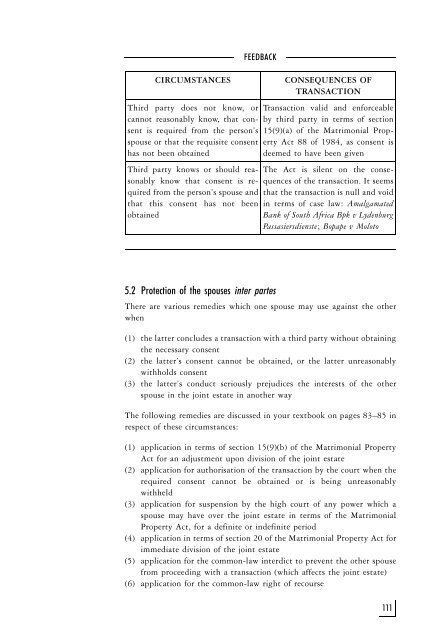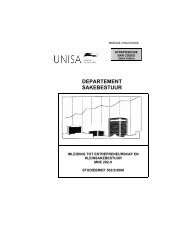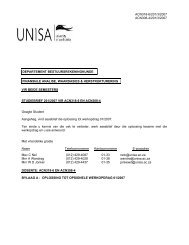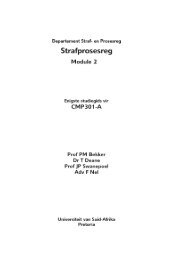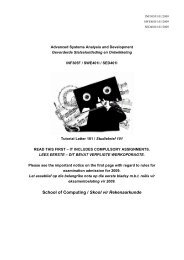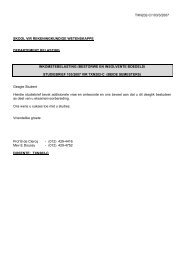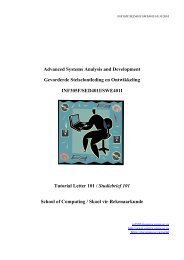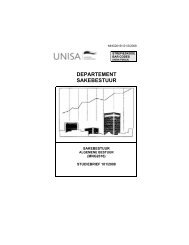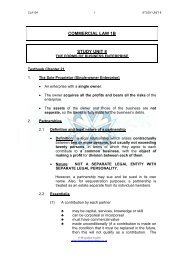key to the study guide - Name
key to the study guide - Name
key to the study guide - Name
Create successful ePaper yourself
Turn your PDF publications into a flip-book with our unique Google optimized e-Paper software.
FEEDBACK<br />
CIRCUMSTANCES CONSEQUENCES OF<br />
TRANSACTION<br />
Third party does not know, or<br />
cannot reasonably know, that consent<br />
is required from <strong>the</strong> person's<br />
spouse or that <strong>the</strong> requisite consent<br />
has not been obtained<br />
Third party knows or should reasonably<br />
know that consent is required<br />
from <strong>the</strong> person's spouse and<br />
that this consent has not been<br />
obtained<br />
5.2 Protection of <strong>the</strong> spouses inter partes<br />
Transaction valid and enforceable<br />
by third party in terms of section<br />
15(9)(a) of <strong>the</strong> Matrimonial Property<br />
Act 88 of 1984, as consent is<br />
deemed <strong>to</strong> have been given<br />
The Act is silent on <strong>the</strong> consequences<br />
of <strong>the</strong> transaction. It seems<br />
that <strong>the</strong> transaction is null and void<br />
in terms of case law: Amalgamated<br />
Bank of South Africa Bpk v Lydenburg<br />
Passasiersdienste; Bopape v Molo<strong>to</strong><br />
There are various remedies which one spouse may use against <strong>the</strong> o<strong>the</strong>r<br />
when<br />
(1) <strong>the</strong> latter concludes a transaction with a third party without obtaining<br />
<strong>the</strong> necessary consent<br />
(2) <strong>the</strong> latter's consent cannot be obtained, or <strong>the</strong> latter unreasonably<br />
withholds consent<br />
(3) <strong>the</strong> latter's conduct seriously prejudices <strong>the</strong> interests of <strong>the</strong> o<strong>the</strong>r<br />
spouse in <strong>the</strong> joint estate in ano<strong>the</strong>r way<br />
The following remedies are discussed in your textbook on pages 83±85 in<br />
respect of <strong>the</strong>se circumstances:<br />
(1) application in terms of section 15(9)(b) of <strong>the</strong> Matrimonial Property<br />
Act for an adjustment upon division of <strong>the</strong> joint estate<br />
(2) application for authorisation of <strong>the</strong> transaction by <strong>the</strong> court when <strong>the</strong><br />
required consent cannot be obtained or is being unreasonably<br />
withheld<br />
(3) application for suspension by <strong>the</strong> high court of any power which a<br />
spouse may have over <strong>the</strong> joint estate in terms of <strong>the</strong> Matrimonial<br />
Property Act, for a definite or indefinite period<br />
(4) application in terms of section 20 of <strong>the</strong> Matrimonial Property Act for<br />
immediate division of <strong>the</strong> joint estate<br />
(5) application for <strong>the</strong> common-law interdict <strong>to</strong> prevent <strong>the</strong> o<strong>the</strong>r spouse<br />
from proceeding with a transaction (which affects <strong>the</strong> joint estate)<br />
(6) application for <strong>the</strong> common-law right of recourse<br />
111


